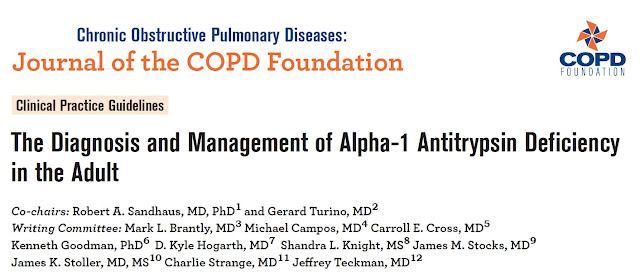Dear Respiratory friends we are happy to present you Clinical Practice Guidelines 2016: The Diagnosis and Management of Alpha-1 Antitrypsin Deficiency in the Adult published today in Journal of the COPD Foundation!
Summary of Recommendations
Testing for Alpha-1
Antitrypsin Deficiency (AATD):
· All individuals with COPD
regardless of age or ethnicity should be tested for AATD.
· All individuals with
unexplained chronic liver disease should be tested for AATD.
· All individuals with
necrotizing panniculitis, granulomatosis with polyangiitis, or unexplained
bronchiectasis should be tested for AATD.
· Parents, siblings, and
children, as well as extended family of individuals identified with an abnormal
gene for AAT, should be provided genetic counseling and offered testing for
AATD (see guideline document for special considerations about testing minors).
· For family testing after a
proband is identified, AAT level testing alone is not recommended
because it does not fully characterize disease risk from AATD.
· For diagnostic testing of
symptomatic individuals, we recommend genotyping for at least the S and
Z alleles. Advanced or confirmatory testing should include Pi-typing, AAT level
testing, and/or expanded genotyping.
Pulmonary function testing in
those with AATD:
· Initial evaluation with
complete lung function testing is recommended.
· Annual follow-up of adults
with at least a spirometry test is recommended.
Computed Tomography (CT) scan
of the chest in the evaluation in those with AATD:
· In newly diagnosed patients
who are symptomatic and/or have abnormal pulmonary function testing, a baseline
CT scan of the chest is recommended.
· Serial chest CT scanning to
monitor progression of disease is not recommended.
Monitoring for liver disease
in those with AATD:
· Monitoring for liver disease
at annual intervals (or more frequently as indicated by clinical
circumstances), with physical examination including focused exam for signs of
liver disease, liver ultrasound, and laboratory monitoring of AST, ALT, GGT,
albumin, bilirubin, INR, and platelets is recommended.
Management of lung disease in
those with AATD:
· Every effort should be made to
prevent exposure to tobacco smoke and facilitate cessation in those who are
smoking.
· Lung volume reduction surgery
is not recommended for individuals with COPD related to AATD.
Intravenous augmentation
therapy in those with AATD is recommended for:
· Individuals with an FEV1
less than or equal to 65% predicted.
o
For those with lung disease
related to AATD and an FEV1 greater than 65%, we recommend
discussion with each individual regarding the potential benefits of reducing
lung function decline with consideration of the cost of therapy and lack of
evidence for such benefit.
·
Individuals
with necrotizing panniculitis.
Intravenous augmentation
therapy is not recommended for:
· Individuals with the MZ
genotype of AATD.
· Individuals with lung disease
due to AATD who continue to smoke.
· Individuals with AATD and
emphysema or bronchiectasis who do not have airflow obstruction.
· The treatment of liver disease
due to AATD.
· Individuals who have undergone
liver transplantation.
Additional recommendations
regarding dosing of intravenous augmentation therapy:
· Weekly doses higher than the
current FDA-approved dose are not recommended.
· Monitoring of trough AAT blood
levels to evaluate the adequacy of AAT augmentation dosing is not
recommended.



